The energy mix and the commons
Buenos Aires, Argentina | 4-5 September 2017
Daniel Chavez
2017-11-14
THE MEETING
On 4-5 September 2017, an International Meeting on the Energy Mix and the Commons was held at the ATE National trade union’s main office, in Buenos Aires, Argentina.
The meeting was framed within a broader process of exchange of knowledge and experiences on climate and energy policies in Argentina, Latin America and the world. The Argentinian State Workers’ Association (Spanish acronym ATE; acronyms will be for Spanish names where applicable) and the Autonomous Argentinean Workers’ Congress (CTA-A) are engaged in international processes towards the construction of regional and global alternatives, in particular the Development Platform of the Americas (PLADA) and the Trade Unions for Energy Democracy (TUED) initiative. The PLADA platform was conceived within the framework of the Trade Unions Confederation of the Americas (TUCA; CSA in Spanish) as a strategic political proposal centred around four dimensions—political, economic, social and environmental—aiming to contribute to the design and implementation of a regional model for sustainable development. PLADA proposes a gradual reduction in the use of fossil fuels, the universalisation of access to energy services, and the rationalization of those sectors of the economy that pollute the most. TUED, a global network composed of workers’ confederations and trade unions, focuses on democratizing generation, distribution and consumption of energy around the world.
The meeting was organised by ATE and CTA-A, with the support of the Transnational Institute (TNI, a worldwide network of scholar-activists based in the Netherlands) and the Latin American and Caribbean Confederation of State Workers (CLATE).

First panel: Energy Democracy, the Commons and Climate Change
Daniel Chavez, a TNI researcher, opened the first panel, providing an overall analysis of the global energy situation. Chavez, an Uruguayan political economist, noted that, globally speaking, the transition to a so-called “green economy” is presented as “inexorable.” He also argued that, “when we take a closer look at the energy mix in all its complexity, we can see that the generation of energy based on non-conventional renewable sources—in particular, wind and solar photovoltaic—does not reach 5%.” He added that, “to speak of democracy in this field, it is essential to think of those who exercise control, those who distribute, and those who own the energy sector. The need for a transition towards a more sustainable energy system is very urgent, but that change cannot be limited to replacing fossil fuels with supposedly greener or cleaner sources. It is also imperative to ensure that the ownership and management of energy production, as well as the distribution, are democratic.”
Chavez enumerated some basic principles of energy democracy: “universal access and social justice; prioritisation of the energy demands of the popular sectors; the generation of energy based on renewable sources, in a sustainable and as a much as possible local and decentralised manner; keeping fossil fuels in the soil—because reaching a system with 100% renewable energy is technically feasible, but the conditions to make it possible are political; forms of ownership and management based on community or state control; and fair wages and decent jobs, with unionised and well-paid energy workers.”
Pablo Bertinat, Professor at the National Technological University (UTN) and a member of the Ecologist Workshop (an environmental think tank based in the city of Rosario, Argentina), argued that “when thinking about the democratisation of the energy sector, it’s essential to set limits to the notion of ‘development,’ especially in a context of inequality like that of our countries.” That is, it is necessary “to discuss the concept of growth, because today we have enough energy for everybody and the conditions to get rid of poverty, but some must have less in order for others to have more.” Bertinat stressed the need to change the rationality of energy: “We need to challenge the current logic of energy policies and replace it with a logic that recentres energy as a right and not as a commodity, promoting local processes of discussion and planning, understanding energy as a public service.” The great challenge that the popular sectors face today, Bertinat argued, “is to build our idea of the future. What we will be producing in two or three decades, how, with what kind of energy and generating energy for what. We must consider a model of development radically different from that imposed today by multilateral organisations.” Concluding his presentation, Bertinat argued that “the keys are to democratise, decommodify, deprivatise, defossilise and deconcentrate. There are our urgent tasks to change the energy system.”
Rodolfo Kempf, member of the National Steering Committee of ATE and CTA-A, and a worker at the National Atomic Energy Commission (CNEA), took the floor next. Kempf said that “in this debate, the starting point is to analyse the particular characteristics of each country. In Argentina, we have a country with energy poverty, and that is dependent and environmentally looted. So, when thinking about ‘energy for what, and for whom?’ we also have to talk about limiting monopolies. Because, for example, Argentine President Mauricio Macri is proposing turnkey financing as the alternative.” Kempf also argued that “another case to consider is the Uruguayan experience, because that country ended up incorporated too much renewable energy by forcing the partial privatisation of the segment of electricity generation. Another thing to keep in mind is the existence of clean energy companies with very poor working conditions for their employees. This is key, because energy must serve to solve social problems.” Kempf concluded by saying that “the goal of a meeting like this is to be able to reach confluences between different sectors, to have a frank discussion and strengthen the unity between workers and organised popular sectors that are struggling against the degradation of the environment.”
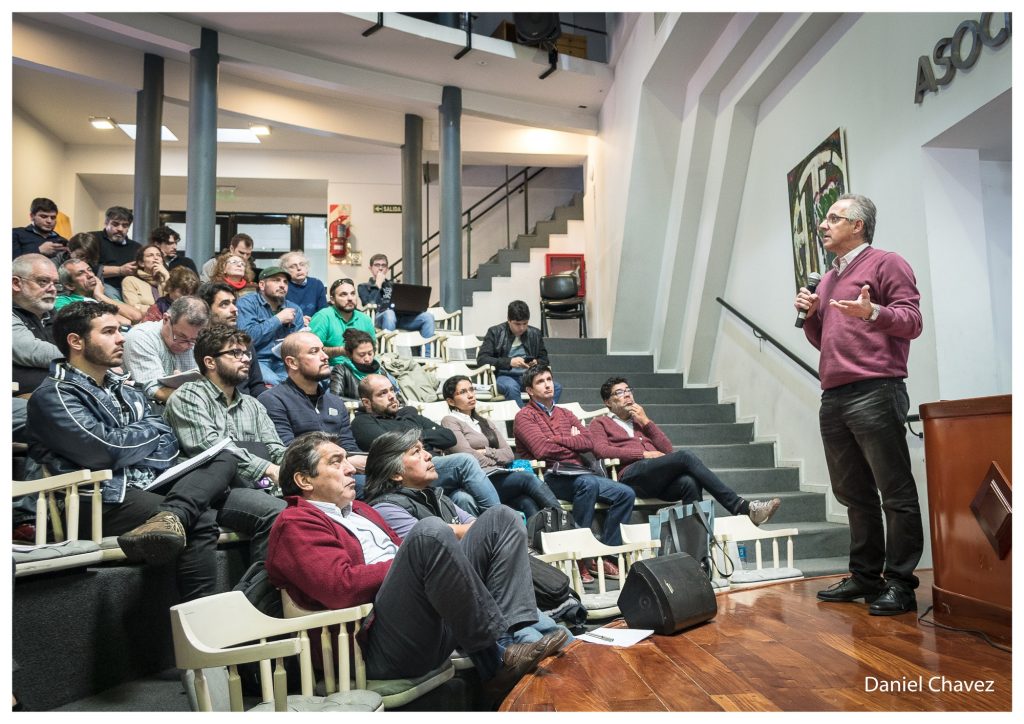
Second panel: Energy and Mining
The second panel included three members of the “Hands Off Jáchal” Assembly (Asamblea Jáchal no se toca)—Virginia Carpio, Marcela Alonso and Haydé Palacios—who described the history of struggle of their organisation, and the social, environmental and health problems they face. These three activists from the province of San Juan denounced the lack of response to their demands, both from the state authorities and from the municipality of Jáchal. They also explained the key findings of a survey carried out by their organisation on the impacts of mining activity in their region.
Veladero is an open-pit gold and silver mine located in the Andean Cordillera. Mining activity has altered water regularity and deteriorated the quality of rivers and creeks, leading to the death of vicuñas [a wild relative of the llama], guanacos [ditto] and fish due to the accumulation of heavy metals. There has also been an increase in cancer deaths among the residents of the area, and aluminium and copper have been found in tomatoes and onions from local plantations. The members of the Assembly complained that “the mining company made promises that have been broken: the announced jobs never arrived, and the current level of unemployment is high. They promised us roads and hospitals; one of the latter was built, but lacking doctors and equipment.”
Also participating on the panel were two coal miners from Río Turbio—Daniel Castellón and Iván Zurita from ATE—and Alexis Chiudick and Marcelo Herrera from the Light&Power trade union. The workers explained that coal production has been stopped for eight months now due to a government decision, and that the trade unions are advocating for the reopening of mining activities as a way to defend jobs. They also demand that the mining companies respect the labour agreement that regulates working conditions, and argued that “in Rio Turbio, national sovereignty is at stake.” In the words of Manuel Medel, a trade unionist of ATE, “the miners have a long history of struggle against the neoliberal system, and part of this fight is to resist the current denigration of the mining worker.”
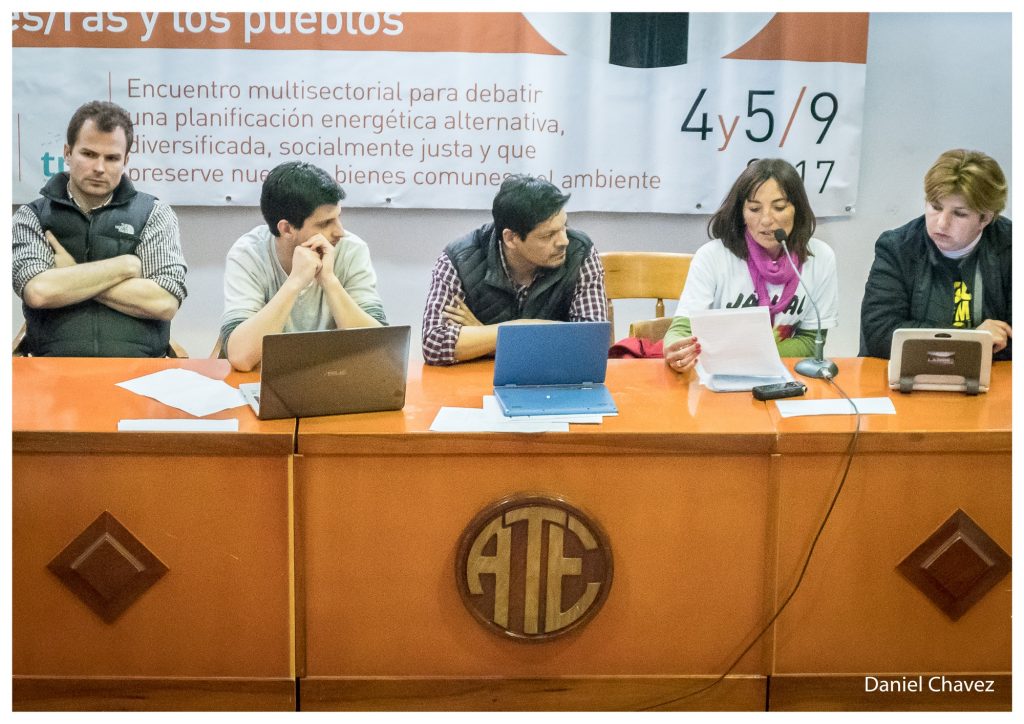
Third panel: Hydroelectric dams
The third panel consisted of María Álvez, Secretary General of ATE Sur Misiones and member of the No to Dams Collective (Mesa NO a las represas) of the same province; Leandro Sánchez, of the No to Dams Collective; Fernando Fernandes, of Movement of People Affected by Dams (MAB, by its acronym in Portuguese); and Alfredo Marcote, representative of ATE in the Provincial Energy Entity of Neuquen (EPEN).
The No to Dams Collective is a group of citizens and organisations involved in diverse actions to prevent the construction of new mega-dams in the province of Misiones, which is located on the triple border between Paraguay, Brazil and Argentina and at the heart of the Guaraní Aquifer [one of South America’s largest underground water reservoirs]. María Álvez gave a detailed account of the struggle by popular organisations in the province to stop the installation of hydroelectric projects and explained the current energy reality of Misiones: “The energy we have in the province is being lost, due to poor transmission and distribution facilities and the lack of investments in public infrastructure.”
As Leandro Sánchez stated: “The struggle that we are carrying out in Misiones isn’t [only] against those who want to build those dams, against those who’re going to make money by flooding routes and building them back, taking people from one side and putting them elsewhere, selling cables, cement, iron, fuel…. The struggle is not only against all that, but also against capitalism. It’s against initiatives like the IIRSA [Initiative for the Integration of Regional Infrastructure; an ambitious plan for expanding the transport infrastructure across South America], which are aimed to make our rivers navigable to take out our wealth faster.”
The MAB representative explained how, during the energy crisis of the 1970s, the military government of Brazil immersed itself in the search for alternatives to electricity generation as a way to secure the country’s national sovereignty. But, as a result, “we lost count of how many dams were built throughout the country, generating huge environmental, social and health problems for the Brazilian population.”
Finally, Alfredo Marcote argued, “In Argentina, we’re inheriting an energy mix imposed by the political powers that ruled us during the past 50 years. We don’t have a say in how this mix is composed, but we are mortgaging our future anyway.” The trade union representative in the Board of EPEN asked, “How do we reach the decision to move to another energy mix? How do we decide whether to switch from this hybrid model that includes hydroelectric, thermal and nuclear power plants to one based on wind farms, for example? We must analyse if that kind of transition is really beneficial for us, if we could achieve the amount of power that the country needs.” Marcote noted that “debates between trade unionists and environmental activists in meetings like the one organised in Buenos Aires are essential, so that workers and other social organisations can engage actively in in-depth discussions on future energy policies.”
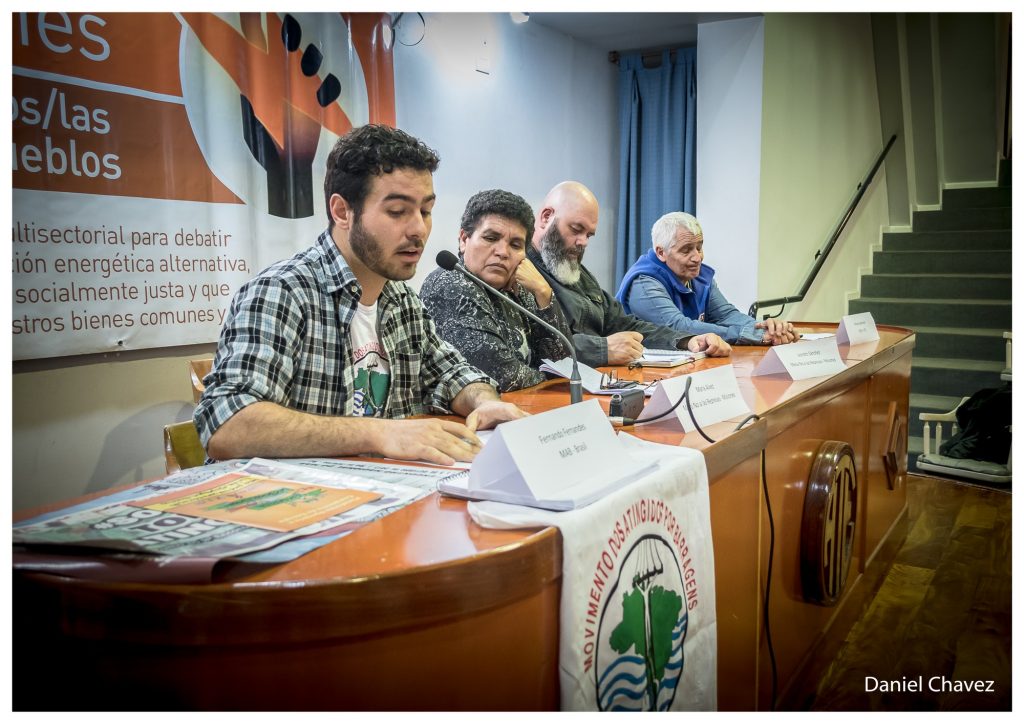
Fourth panel: Energy policies in Brazil
The original agenda of the meeting was modified to allow the participation of the Brazilian speakers, who had to advance their presentations due to a change in the departure time of the flight back to their country. Daniel Angelim, responsible for Environment and Work Affairs at CSA; Daniel Gaio, Secretary of Environment at Brazil’s Unified Workers’ Central (CUT); and Diego Azzi, Professor of International Relations at ABC Federal University (UFABC) in Sao Paulo, explained the profound changes observed in Brazil since the coup against President Dilma Rousseff orchestrated by the sectors that support her successor, Michel Temer.
Daniel Angelim summarised the main orientations of the ongoing wave of privatisation in Brazil, which started with the opening of foreign companies to operate in the oil sector. He also warned about the upcoming privatisation of the company Eletrobras, for which Temer himself travelled to China to interest Chinese investors. The CSA, Angelim underlined, “will implement a plan of mobilisations to fight against the privatisation of national energy companies.” He explained that meetings similar to the one organised in Buenos Aires are taking place in several other cities in Latin America, to strategise around the environmental and energy perspectives of the countries of the region. Angelim also reported that in the framework of regional mobilisation a series of union-driven activities will be held in November in the city of Montevideo, including a large meeting of trade union organisations, environmentalists and other social organisations to elaborate a joint plan to fight for energy democracy.
Daniel Gaio, representative of the CUT, summarised the basics of the new energy policy that the federal government has tried to impose since the coup: “To what Daniel Angelim has already explained about Eletrobras and Petrobras we must add another dimension, which refers to a call to foreign investment to privatise regional state-owned water and sanitation enterprises.” Gaio also provided a political analysis of this process: “Michel Temer invites transnational corporations from the United States, China and Europe to invest in Brazil, and in exchange offers them a violent labour reform that will cut workers’ rights, and which could also be replicated by other governments in Latin America.” Later, Gaio said that those forces involved in the coup are also enabling the sale of land to foreign capital, as well as implementing changes in legislation around the mining code and the use of the Guaraní Aquifer: “With the new mining code, companies are now allowed first to exploit and only then care about the environmental impacts.” Gaio also pointed out that in the framework of Temer’s radical neoliberalism, “South-South international relations characterised by support for the development of other countries of Latin America and Africa are over.”
Brazil currently generates 43% of its energy from hydroelectric sources, while the world average is around 11%. It has also been moving forward in the field of wind generation. But this year, with Temer in government, “public investments are withdrawn, and new dams are planned,” Gaio informed. For all of this, CUT will host, in May 2018, an Alternative World Water Forum that will focus on the impacts of the new energy and water policies of the Brazilian government on the Amazon region (also threatened by mining).
Diego Azzi of UFABC argued that “after Dilma, we suffered a clear policy turn, with a larger opening to foreign capital. In Brazil, oil exploitation had always been mainly in the hands of the state, but Temer is opening the way to foreign investments.” According to Azzi, “the opening to foreign capital, the financial liberalisation and the labour reform point to a new positioning of Brazil within the OECD framework.” Azzi concluded his presentation stating that, “this new context forces us to rethink the Brazilian national project, and therefore also to rethink our energy policy.”
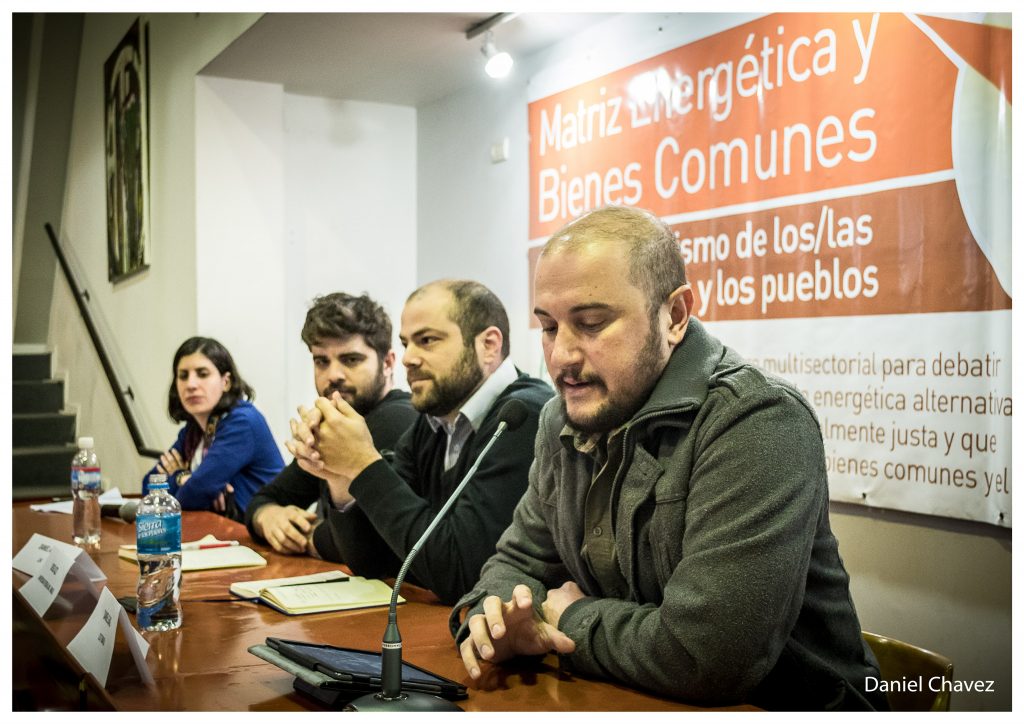
Fifth panel: Hydrocarbons
Horacio Fernández, Director of the Institute for State and Participation Studies (IDEP) coordinated the fifth panel. He emphasised the importance of the discussion on non-conventional techniques of hydrocarbon production, considering that in Argentina, the meeting’s host country, 22% of gas production comes from fracking.
Felipe Gutiérrez, a member of the Southern Petroleum Observatory, from the province of Neuquén, summarised the continuities and ruptures in the energy policy of the current government led by Mauricio Macri vis-a-vis the governments of Néstor Kirchner and Cristina Fernández de Kirchner: “Broadly speaking, Kirchnerism deepened neoliberal politics, and the references to counteracting neoliberalism within the discourse centred on the concept of national sovereignty were rather propagandistic. The purchase by the state of 51% of the shares of Yacimientos Petrolíferos Fiscales [YPF, the national oil company] did not mean a policy change. The difference is that it maintained low prices, while Macrism imposed a tariff hike seeking an abrupt transfer of resources from residential users to businesses, to keep the subsidy plans that had been launched in the year 2008.”
In addition, Gutierrez explained, “fracking is not a good business because the rentability of a well is already lost after the first year. Why would anyone get into this business? Because the profits are guaranteed by the state.”
It was then the turn of Héctor Jorge Nahuel, Werken [traditional authority] of the Mapuche Confederation of Neuquén, who referred to the social and cultural impacts of fracking and the hydrocarbon industry on the Mapuche and other indigenous communities of the region. The Vaca Muerta oil and gas field is located in Loma Campana, in Mapuche territory. “The euphoria for energy autonomy based on hydrocarbons occurs within a framework of absolute illegality and a media campaign that portrays us, the Mapuche activists, as terrorists,” he said. “The right to our land as indigenous territory is assured by international agreements embedded in the federal constitution of Argentina. However, in this context, our struggle is portrayed as something subversive. The disappearance of Santiago Maldonado [an Argentine social militant who disappeared during the repression by the National Gendarmerie to a demonstration led by Mapuche organisations on 1 August 2017] has reinstalled in the political agenda the long-standing conflict between the state and the native peoples. With the discourse of energy sovereignty, they try to silence the mobilisation of a people whose land has been invaded, broken and polluted. We believe that this conflict will escalate, because the state is not willing to respect rights that have already been recognised, opting instead for the militarisation of our territory”, he concluded.
The panel was closed by Luisa Fernanda Pedraza, from CENSAT Agua viva (Friends of the Earth Colombia), who explained how the advance of the extractivist frontier in her country was carried out in the context of war and environmental and fiscal flexibilisation for the benefit of transnational corporations. “In the framework of the peace process, local communities are discussing what we’re not supposed to challenge, which is the developmental and energy models, because the government seeks to implement a neoliberal energy policy and manipulate the communities affected by the armed conflict. That’s because oil revenues are needed to finance the peace agreement. But the anti-fracking struggle led by the Fracking-Free Colombia Alliance, which brings together more than 70 organisations, has an unprecedented element, which is the active participation of the largest trade union in the oil sector. Our struggle posits that Colombia will not achieve peace if it doesn’t achieve social justice and environmental justice,” explained Pedraza.
“There is an actor that must be taken into account in the Colombian context: neo-paramilitarism, which we believe is subordinate to the extractive model and reaffirms the imposition of the mining-energy dictatorship, not only through legal channels but also via paramilitary activities. The war for water is immediate, and therefore the mobilisation in defense of this common good is something that has allowed the convergence of the struggles of different sectors; but the popular organisations of the world, as in Colombia, are already realising that they must also unite to decide about what is underground,” said Pedraza closing her intervention.
Sixth panel: Nuclear energy
Rodolfo Aguiar, Secretary General of ATE Río Negro, moderated the sixth panel. He stressed the importance of the meeting as a space that enabled collective thinking about the energy mix from the perspective of the trade union movement. “During these two days of self-training, we went beyond what’s expected to be our role. We’re supposed to limit ourselves to discuss wages and conditions of employment,” Aguiar said. “I haven’t been put in jail for claiming better wages, but I was imprisoned when we went to the street to publicly say that Macri’s visit to our province was a farce to promote his Patagonia Plan [a programme aimed at economic development and the expansion of infrastructure in the six southern provinces, launched by the Argentine government in February 2017], and when we resisted Plan Castello [another programme to build infrastructure in the province of Rio Negro, to be financed with foreign financing and launched by the provincial governor in January 2017 ].” He added: “We should celebrate that we got a provincial law against the nuclear power plant that was going to be built by China, and that we managed to push back the national government of Mauricio Macri and the provincial government of Alberto Weretilneck.”
Next, Jesuana Aizcobe, a CNEA worker, pointed out that the contributions to national development made by the nuclear energy state agency in its 65 years of existence are extensive and not limited to electricity generation. She stated that “our contributions also include support to health services and agrarian production, among other sectors.” Aizcobe also argued that “Argentina is a dependent country, and in the nuclear sector the fight against dependence is expressed in the struggles led by the workers. And this government has deepened dependence, because its energy policy ignores all the impressive and autonomous technological development achieved by the country in the field of nuclear power. Today, we feel that nuclear energy is portrayed as something negative.” Aizcobe concluded by saying, “In the CNEA, we do not believe that the nuclear option should be the only one, but that our country must go to a diversified energy matrix, but that includes atomic energy because this form of energy generation has many benefits.”
Laura García Vázquez, a member of CTA-A in the province of Buenos Aires, stated the following: “We’re facing very complex problems that require complex solutions, but above all unity in action. We’ve been working hard around the issues of fracking and hydrocarbons, but the essential point in the energy policy field is sovereignty. For us Argentines, it’s very important to talk about energy sovereignty again, because in the case of the fifth nuclear plant that was intended to be installed in Rio Negro, foreign interests—in this case from China—were clearly prioritised, with a proposal of building large infrastructure packages without Argentinean participation.”
García Vázquez, who is also the editor of the media collective, Libres e Iguales [“The Free and Equal”], added: “If we take a purely environmentalist position, when we’re faced with negative impacts we will say that we don’t want them. In the case of fracking and open-pit mega-mining, the profits are amply exceeded by the environmental costs, and the worst thing is that the profit doesn’t remain in the country. Nuclear energy gets very bad press; when people think about nuclear plants, they immediately think about accidents or terror attacks, or even nuclear war. Nuclear generation has been discredited to the point of exaggeration. If we had a free and sovereign country, we’d have to evaluate the costs and benefits of each energy option. Let’s think about Bahía Blanca, which is one of the cities with the highest unemployment, despite having the Petrochemical Pole, because industrialisation doesn’t always bring jobs in the quantity and quality we required.” García Vázquez concluded her presentation by stating, “We must think of a diversified energy mix that guarantees basic rights for all Argentines, and for that, we need to find out what tools capitalism and neoliberalism are using today.”
After each round of contributions, the moderator opened the floor to questions and comments. The sixth panel attracted the greatest number and diversity of interventions, with a very heated debate on the pros and cons of nuclear energy from the perspective of democracy and energy sovereignty and the meaning of the concept of just transition.
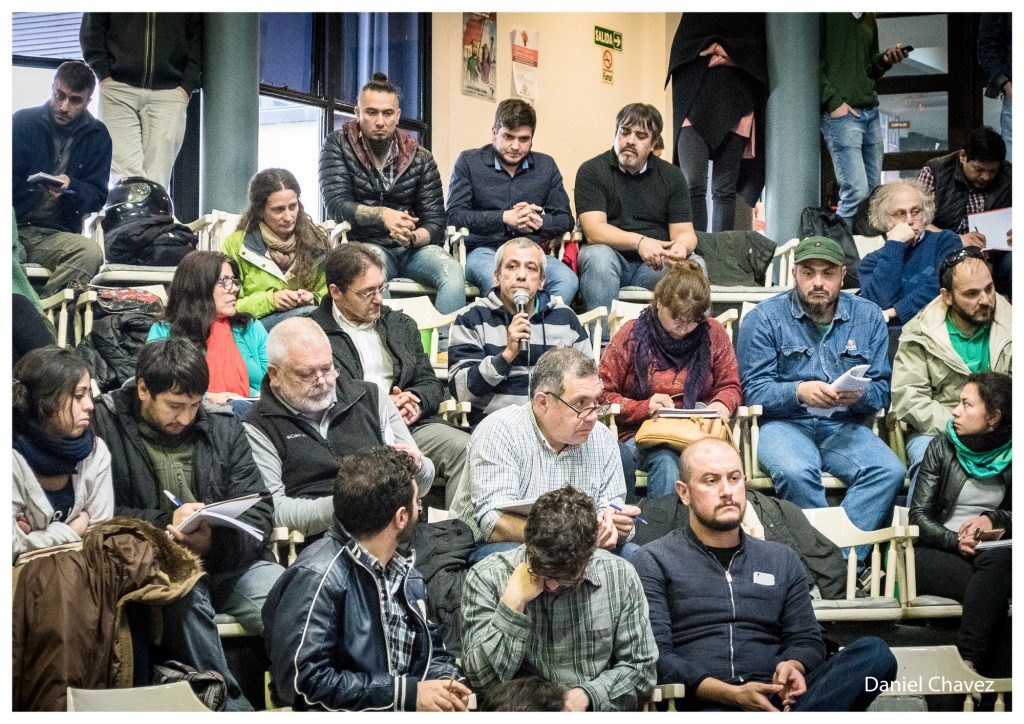
Seventh panel: Renewable energy
The seventh panel was opened by Juan Pablo Duzdevich, an engineer at the National Institute of Industrial Technology (INTI), who spoke about the advantages of wind power generation. Duzdevich mentioned the different types of wind turbines used in the world and in the country to produce renewable energy and provided details on the technical characteristics and exponential growth that these systems are showing in Argentina and internationally.
Dr Julio Durán from CNEA, an expert in photovoltaic electricity generators, spoke next. Durán explained that within the broad spectrum of energy, only part of it concerns electricity, but within that part, renewable sources are growing rapidly all over the world. Durán also noted that there are countries in Latin America (in particular, Uruguay and Costa Rica) that already supply more than 90% of their electricity consumption with renewable energy systems.
To close the panel, José Elosegui, member of REDES (Friends of the Earth Uruguay), spoke about the Uruguayan energy policy and the country’s rapid and vast transition to wind power. In less than a decade, Uruguay has positioned itself as one of the world’s leading countries in renewable energy generation: “We have invested in energy options that don’t contribute to the global climate crisis. It’s crucial that we generate fewer greenhouse gases to stop global warming.” Elosegui highlighted the Uruguayan people’s long tradition of struggle against privatisations and bilateral investment treaties (due to the political pressure exerted by the labour movement and other social organisations, Uruguay was the first country in the world to withdraw from the negotiating table of the Treaty in Services Agreement, TISA, in 2015). Elosegui also stressed the importance of having an energy policy agreed by all the country’s political parties, as well as the significance of having a strong national and state-owned energy company (UTE) as an essential player in the transition to a new model of generation based on renewable sources.
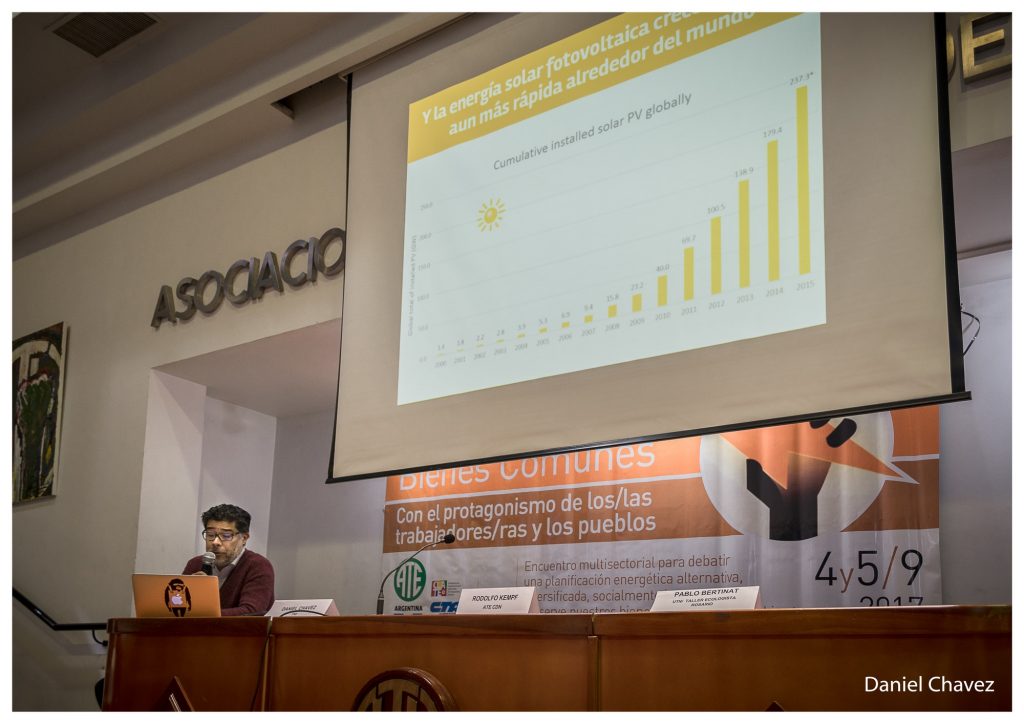
Closing panel: Towards and energy matrix proposed by workers
The closing panel began with a presentation by Joaquín Turco, CTA-A’s Secretary for International Relations. Addressing previous debates on the future of energy policy and the meaning of sovereignty, Turco stated the following: “This conversation must be carried out collectively. Nobody here is the owner of the truth. The energy system involves a lot of policies and processes: public policies, sectoral conflicts, strategic alliances, geopolitical alliances, relations between energy and the distribution of wealth, and so on. So, the discussion about the energy mix that we want should be part of a broader discussion that must be developed from a regional perspective.”
Next, Lydia Forero, Coordinator of TNI’s Environmental and Agrarian Justice Program, took the floor. The Colombian economist began her talk demanding the appearance of Santiago Maldonado alive and saying, “His disappearance is not just a concern of the Argentinean or the Mapuche peoples, but of all the peoples of Latin America.” Next, Forero expressed her evaluation of the meeting: “It was fascinating to hear the different positions in the debate. For me, the most significant contributions were the stories of struggles against the imposition of models that we heard from many comrades. We have to put on the table those differences that might divide us today, but we must also do it from a perspective seeking unity, in defence of the rights and territories of the people struggling against the neoliberal model.” Forero added, “It is very important to know the points of consensus and dissent. But it shouldn’t be about fighting between us, but about understanding that all these struggles are part of a common struggle in defence of our planet.”
Finally, the meeting was closed by the Deputy Secretary of National ATE, Julio Fuentes, who thanked all the panelists and participants for their contributions to the collective discussion and announced the organization of many similar activities in the near future: “I want to thank the organisations who came up with the idea of this meeting; I want to thank the comrades who were in charge of organising this activity, and the colleagues from all Argentina and other Latin American countries who took part in our conversation.”
Fuentes, who is also the president of CLATE, added, “In the last congress of our confederation, held in Cartagena de Indias, Colombia, last February, we agreed on a roadmap towards a redefinition of the objectives of our organisation, now that it’s turning 50 years old. And what we agreed was that CLATE must propose and build an anti-capitalist, classist, antipatriarchal, plural, and internally diverse model for workers’ action. But we also agreed that ours must be an ecological model. Because we believe that unions’ struggles cannot be divorced from the fight for the environment.”
“There is a reflection that I heard from several colleagues during the meeting: not only shouldn’t we buy nuclear power plants, dams, or the technology that is sold to us by foreign powers. Above all, what we have to reject is the capitalist model of consumption. Because under that model, the planet isn’t sufficient to satisfy us all. We can’t accept that standard of life, where the only thing worth doing is to buy more, with the loss of the capacity of men and women to be happy in our planet, living in harmony with it. Thank you very much, and let’s continue to engage in future debates to reconcile positions with workers who might come with other visions,” Fuentes concluded.
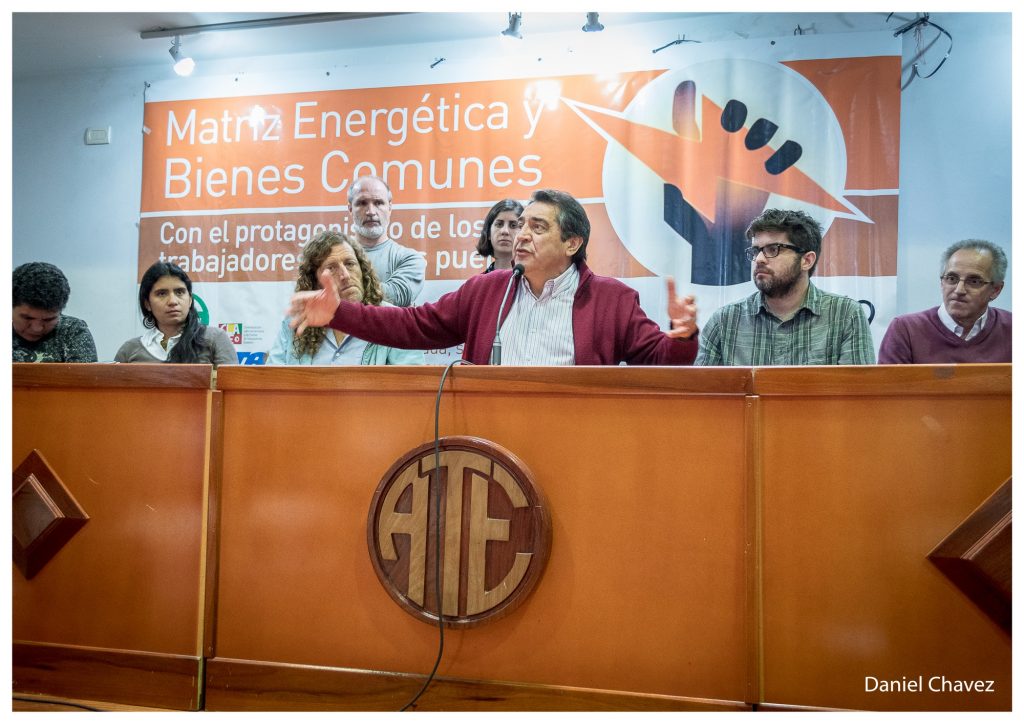
This report was produced by CTA-A. Translated and edited by Daniel Chavez. Its contents may be freely quoted or reproduced for non-commercial purposes, provided that the source is properly cited.
© 2017 Daniel Chavez